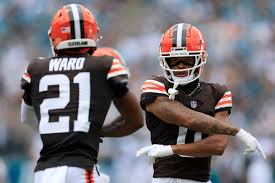
If social media had existed six decades ago, Browns legend Gary Collins would have gone viral for delivering a prediction bold enough to make today’s best NFL trash-talkers squirm.
In the days preceding the NFL championship game on Dec. 27, 1964, Collins told Cleveland CBS affiliate WJW (Channel 8) the Browns would win big. The Baltimore Colts were considered overwhelming favorites, but Collins proved to be prophetic. The Browns triumphed 27-0 on a cold, windy afternoon in Cleveland.
With Friday marking the 60th anniversary of the Browns winning their last NFL title, the 84-year-old Collins recently spoke to the Beacon Journal by phone from his home in Hershe.
“Well, the fact that we were not favored to win and we kicked their ass,” Collins quipped.
Browns coach Blanton Collier didn’t appreciate the bulletin-board material Collins provided, yet the standout wide receiver backed up his talk. He caught five passes for 130 yards and three touchdowns from quarterback Frank Ryan and became the game’s most valuable player.
“I was a cocky kid,” Collins said. “I didn’t know any better. I should have had my face slapped.
“[After we won], I said, ‘Well, I told you.’ That’s all I kept saying. You know how a young guy, a 24-year-old, does.”
Quarterbacked by Johnny Unitas and coached by Don Shula, the Colts entered the championship showdown 12-2 and ranked first in the NFL in points per game (30.6) and fewest points surrendered a game (16.1).
Headlined by running back Jim Brown, the Browns were 10-3-1 and ranked second in points (29.6) and fifth in fewest points allowed (20.9).
With the title at stake, the Browns came much closer to playing a perfect game than the Colts.
“As a team, I think we made less than 10 mistakes,” Collins said.
Although Collins had grown accustomed to performing well and still holds Cleveland’s regular-season franchise record for career touchdown receptions with 70, he considers the championship game the best outing of his life.
After the first half yielded a scoreless tie and Lou Groza made the first of his two field goals to give the Browns a 3-0 lead in the third quarter, the Collins-Ryan tandem asserted its will with the Colts often double-teaming another Browns wide receiver, Paul Warfield. As a rookie, Warfield had one catch for 13 yards against Baltimore.
“Gary Collins would win all of the one-on-one battles with people attempting to cover him if [the opposing defense] wanted to give me additional concentration,” Warfield, 82, said. “All of those battles were against the very top cornerbacks in pro football.”
“Gary Collins just took over,” said John Wooten, 88, a Browns guard from 1959-67.
The exclamation point emerged in the fourth quarter. Collins secured the ball on a deep pass from Ryan despite Boyd getting a hand on it, wiggled away from the star cornerback at the 10, crossed the goal line for a 51-yard TD and then disappeared into a sea of fans standing behind the end zone.
“They wanted to pull my jersey off, but they didn’t,” Collins said. “I’m sure they were drunk, most of them, but at that point in time, 27-0, I didn’t give a s*** about anything.”
Two seasons prior to the first Super Bowl, an announced crowd of 79,544 attended the NFL title game at the old Cleveland Municipal Stadium. A broadcast “blackout rule” precluded much of Northeast Ohio from receiving the television signal. The team partied after the game at the Sheraton-Cleveland Hotel. There was no championship parade.
Times were different then, though Collins basked in his fair share of glory. He said he appeared on “the Ed Sullivan Show” and “the Bob Hope Show” in addition to a national commercial. His MVP award came with a brand-new red Corvette presented by Sport Magazine. He sold the car after about two years.
“Got too many tickets,” Collins said.
Collins lived in Aurora at the time. He has resided in his home state of Pennsylvania since 1972. Collins explained he has thought about the 1964 championship every year on Dec. 27, but he doesn’t want to become too wrapped up in the fact it happened 60 years ago Friday.
“I’m 84, so you don’t want to dwell on things too long,” he said with a laugh.
Five members of the 1964 Browns have been enshrined in Canton: Brown, Groza, Warfield, running back Leroy Kelly and guard Gene Hickerson. Also in the Hall of Fame are six of their Colts opponents from the championship game: Unitas, guard Jim Parker, running back Lenny Moore, tight end John Mackey, receiver Raymond Berry and defensive end Gino Marchetti, plus Baltimore’s coach, Shula.
Collins is not among them.
In 10 NFL regular seasons from 1962-71, all with the Browns, Collins caught 331 passes for 5,299 yards (16 yards per reception) and 70 touchdowns in 127 games, including 106 starts. In eight playoff appearances, he caught 19 passes for 275 yards and five touchdowns. He finished three seasons ranked among the league’s top 10 in catches, two among the top 10 in receiving yards and five among the top 10 in receiving touchdowns. He led the NFL with 13 TD catches in 1963.
“I played with Jim Brown, Leroy Kelly,” Collins said. “The first thing you did in that era is you ran the ball. If you got 60 plays, 35 of them you ran. And if you completed 14 (passes), that was a good day. And if you caught three balls in one game, that was a lot. So if you want to statistically, as a wide receiver, have a lot of catches, don’t come to Cleveland. You’ll win, but you’re not going to [have monster numbers]. Am I deserving of the Hall of Fame? I don’t know. A lot of people tell me that.”
Even with Collins shining in the title game, the Browns rushed 41 times and attempted just 18 passes. Brown had 27 carries for 114 yards and caught three passes for 37 yards.
“If any member of the Pro Football Hall of Fame [selection committee] asked me about Gary Collins and his contribution, you simply look at the fact that basically during that era the Cleveland Browns were a run-oriented football team,” Warfield. “In the history of pro football, we had its greatest runner [with Brown].
“Nevertheless, we had an enormous passing attack. Gary Collins, in particular, I don’t know of another pass receiver in my time playing in the league or previous to my time or thereafter who had the ability to score from 20 yards going in, or in the so-called red zone, who was just unstoppable.”
Collins capitalized on his opportunities. He rarely dropped a pass throughout his career. He said he thinks he had four or five drops in the NFL. At 6 feet, 4 inches, his playing weight typically fluctuated between 212 and 215 pounds. The best 40-yard dash time he ever posted was 4.65 seconds.
“Even then, it’s not fast,” Collins said. “But at point of break, I was pretty quick.”
The Hall of Fame’s selection committee chose Collins as a flanker on the All-Decade Team for the 1960s. He earned two Pro Bowl and two second-team All-Pro selections (1965 and 1966) along with one first-team All-Pro nod (1969). He was inducted into the Browns Legends program in 2004.
When Collins was asked whether he’s bothered by being excluded from the Hall of Fame, he said, “No. It’d be nice before I croak, but I don’t see it happening.”
A first-round draft pick of the Browns in 1962, Collins said Collier should be inducted and pointed out how much the coach fostered his development not only as a wide receiver but also as a punter.
“He would work with me individually after practice because he tried to fit what I could do and not what Warfield could do and vice versa,” Collins said. “He fit the pattern to my ability, and that’s the way you’ve got to do it. I can’t do what Paul Warfield does and vice versa. A guy will come up and say, ‘Well, I want to be like Jim Brown.’ Well, s***, no one’s going to be like Jim Brown. Try to be a little bit like him, but you’re not going to be like him.
“[Collier] would say to you, ‘On that outside move you, you’re breaking it off a little bit too quickly. Just go another step, and it’ll come out where you’re not out of bounds on the catch.’ It worked, so you believed him. He helped me a great deal on the punting aspect because if your footwork is wrong in anything in the kicking skill, you’re going to not have a result that’s positive. It’s going to be bad. But he helped me a great deal. I had the natural ability of being able to punt, but he could correct a little mistake. Most guys couldn’t do that.”
Collins punted full time for the Browns from 1962-67. Don Cockroft handled kicking and punting duties beginning in 1968. Collins posted a regular-season career average of 41 yards a punt. He led the league at 46.7 yards in 1965. In the 1964 title game, he punted three times for an average of 44 yards.
“I never got a dime extra [for punting], and if I screwed up, then I heard about it,” Collins said. “It pissed me off, and I’d tell [the Browns] that. They said, ‘Well, that’s part of your talent.’ The generation before me, Lou Groza did all the kicking, and he was All-Pro left tackle offensively. So it was a pattern. In other words, [NFL teams] were goddamn cheapskates.”
Back then, players didn’t have agents.
“No one, including Jim Brown,” Collins said.
Collins eventually requested a trade to Washington, not far from where he played football at the University of Maryland. The Browns declined to indulge him.
“I was stubborn. I said, ‘Well, I’m going to retire,’” Collins said. “So I cut my throat a little bit. Stupid. I was 32. Nothing wrong with me. They couldn’t have said, ‘Well, he lost speed.’ I never had speed.”
Collins said two or three of the passes he dropped in his career occurred during his final NFL game in 1971. Browns fans booed him in the same stadium where he had helped Cleveland win it all.
“It’s sports,” Collins said. “You’ve got to understand it. People are fickle. They have bets. They don’t give a s***, and I understand it. So when someone comes up to me and says they’re a great fan, well, I believe you, if we’re ahead.”
To this day, Collins isn’t inclined to bite his tongue. He spoke his mind 60 years ago and foreshadowed the Browns beating the Colts.


